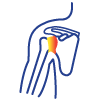
Frozen Shoulder
What is a Frozen Shoulder?
Frozen shoulder, also known as adhesive capsulitis, is inflammation of the shoulder capsule. While often progressing slowly, the frozen shoulder eventually results in severely restricted range of motion and a feeling of substantial stiffness.
What are the Symptoms of Frozen Shoulder?
Frozen shoulder symptoms tend to come on slowly. Typical symptoms include:
- Moderate to severe pain
- Persistent stiffness
- Limited range of shoulder motion
Frozen shoulder often follows 3 stages:
- “freezing” phase- increasingly severe shoulder pain, which can last for weeks or months
- “frozen” phase- pain gradually subsides, but stiffness lingers. This can last for many months
- “thawing” phase- continued reduction of pain and slow improvement in range of motion. This phase varies greatly in duration, lasting up to 2 years.
What Causes a Frozen Shoulder?
In many cases the exact cause of frozen shoulder is unknown. Diabetes, thyroid conditions, and previous shoulder surgeries appear to increase the likelihood of developing frozen shoulder, as well as any condition which causes the patient to immobilize the shoulder joint.
What are the Treatment Options for Frozen Shoulder?
Frozen shoulder is usually treated conservatively, but in a handful of cases, a short arthroscopic surgery may be necessary to completely restore the patient’s range of motion. The ultimate course of treatment depends on the severity of the condition.
Most patients with frozen shoulder respond best to a 4-5 month dedicated physiotherapy and rehabilitation program, designed to restore the shoulder’s range of motion and strengthen the muscles and ligaments surrounding it. Anti-inflammatories and corticosteroid injections may also be used to alleviate inflammation, in order to allow the continuation of strengthening and stretching exercises as part of the rehabilitation process.
If you continue to suffer from a limited range of motion following conservative treatment, frozen shoulder can be treated with minimally invasive arthroscopic surgery. Your orthopaedic surgeon will break down and remove scar tissue in the shoulder. Most patients are able to resume normal activities within a week, with many enjoying a complete recovery in as few as six weeks.


